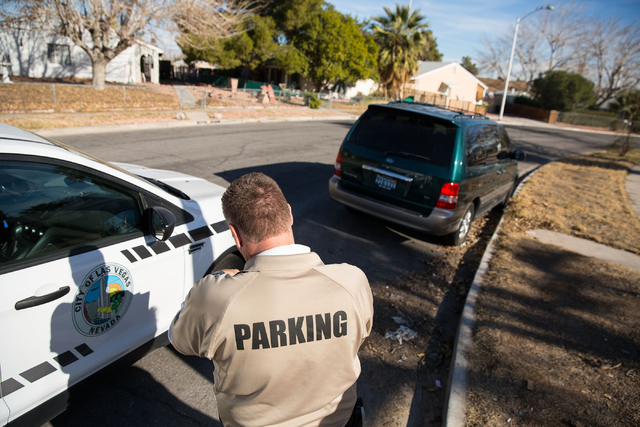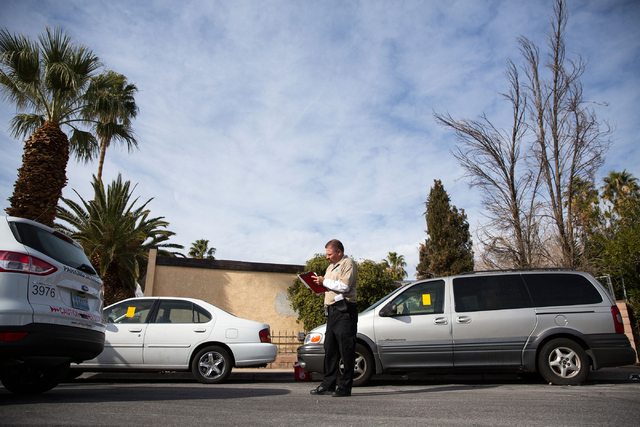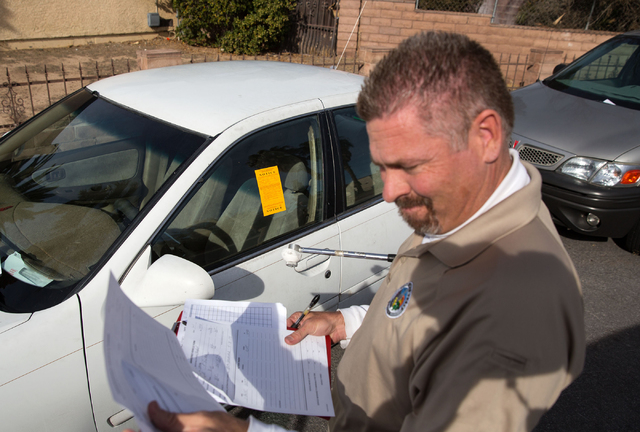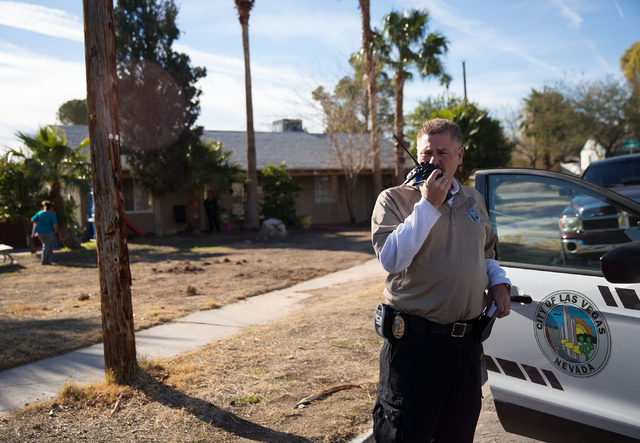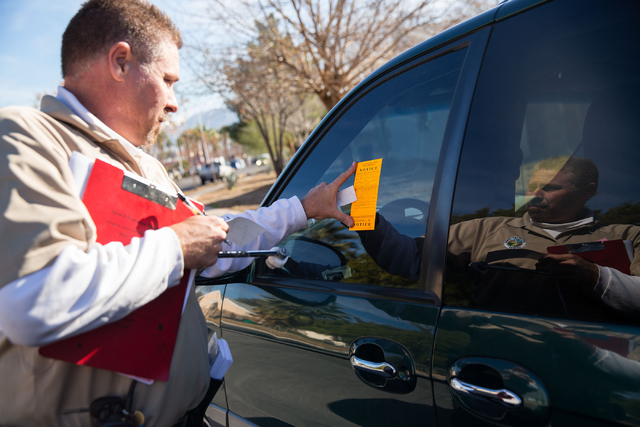Las Vegas’ low-income areas hit harder by parking tickets, analysis shows
The slogan stenciled above the entrance to Las Vegas’ downtown municipal parking headquarters reads “Making Parking Easy.”
And it is easy, unless you park downtown or live in a poor neighborhood.
A Las Vegas Review-Journal analysis of 366,347 parking citations issued over the past four years found that low-income neighborhoods shouldered a disproportionate share of the city’s most-ticketed residential blocks.
Poorer ZIP codes also took on a lopsided chunk of surcharges — parking ticket late fees — issued on those streets over that same period.
City officials say some of those fines and fees can be chalked up to selection bias, since poor neighborhoods feature fewer garages and less available parking, and tend to attract more abandoned cars and calls for service.
Residents who live in and around those neighborhoods see it differently.
“It doesn’t make sense,” longtime West Las Vegas resident Pat Johnson said, setting aside a game of Rummikub at the Doolittle Senior Center. “They need to go somewhere else.”
“I know last year they were going through here taking pictures of license plates,” added Johnson’s friend Mattie Jackson. “I have heard they target people in lower-income areas because if you can’t afford it, then the tickets just keep on accumulating.”
CABBIES, CASINO CROWD NAKED CITY
Around 1,300 locations accounted for nearly 90 percent of Las Vegas’ parking tickets since 2010. Each of those blocks averaged at least five tickets per year.
Among tickets written at those locations, almost two-thirds were issued on usually congested streets in and around downtown, most at underfed meters and handicapped parking spaces.
Half of the rest were issued in residential neighborhoods, where Las Vegans, their friends and family members faced fines from $20 to $250 for everything from expired registration stickers to being parked within 15 feet of a fire hydrant.
Only 27 of the city’s most-ticketed residential locations — those that averaged at least 25 parking tickets per year — lie in Las Vegas’ statistically newer, whiter and more affluent neighborhoods west of Rancho Drive.
The rest, some 58 addresses, fell on the east side of the city — home to four of the city’s five poorest ZIP codes and all but a few of Las Vegas’ oldest, poorest and traditionally minority neighborhoods.
Take Naked City, where five blocks racked up at least 2,421 parking tickets since 2010, one of the city’s highest per-capita tallies.
City parking officials point to a combination of street-sweeping zones and time-restricted parking areas to help explain the explosion of tickets in that neighborhood, which is roughly bounded by Interstate 15 and Las Vegas Boulevard South, between Wyoming and Sahara avenues.
An ordinance approved by city leaders in 1999 put up several two- and three-hour restricted residential parking zones in the neighborhood in a move meant to clear cabbies and casino employees out of residential, Stratosphere-adjacent parking spots.
Most neighborhood residents favored approving the effort at the time, city parking staff members said. It’s hard to say how many tickets have been issued since to those whom the zones are meant to protect, parking staff said.
Meanwhile, neighborhood residents and guests still have to pay the city up to $20 a year for the right to park in front of their own apartment, or else risk mountains of tickets, surcharges and, eventually, a parking boot.
“This is about money,” said retiree and longtime resident Larry, who declined to give his last name. “So why not go write tickets in places that have money? Why don’t they go to Summerlin or Spanish Trail?”
Hoover Avenue — a low-profile street in the Arts District — counts as the city’s single most-ticketed residential address by a long shot.
Hoover, too, has become a popular hangout for cabbies.
Asked about the street, city parking officials blamed most ticketing activity on residents at the nearby Newport and Soho lofts who “can’t or won’t” park in their respective buildings, despite the heavy taxi presence in the area.
Parking staff say several new “taxi zones” — parking spots that abruptly convert into taxi-only areas after 8 p.m. — disproportionately affect average Las Vegans, who are the ones most often confused by the new rules. They say they weren’t consulted by city leaders before the zones were created 2013.
The city has collected $86,000 in fines and fees from the zones since then. Nevada’s three largest cab corporations made at least $100,000 in campaign contributions to city leaders since 2008.
Councilman Bob Coffin has helped cabbies and other businesses add several accommodating tweaks to parking policies in the Arts District and Naked City over the past three years.
He figures it’s worth finding out whether residents who share those neighborhoods have a few parking policy suggestions of their own.
“It isn’t the job of the parking people to figure out whether or not people can afford to pay these tickets, that’s not in their portfolio,” Coffin said. “It becomes a political issue if it’s an abuse, that’s why you’ve my ears.
“We need to know if someone is picking on easy prey — the low-hanging fruit — because they’re poor and they can’t afford to live in a place with a parking spot. … We have to find that out.”
WEST LAS VEGAS TARGETED?
In West Las Vegas, home to eight of thsse city’s most-ticketed residential locations, few residents the Review-Journal talked with were surprised at the yawning gap between the number of tickets written in their backyard and the relatively meager tally of tickets written in Summerlin.
The historically black neighborhood — roughly bounded by Rancho Drive and I-15 between Carey Avenue and Bonanza Road — includes part of two ZIP codes where at least half of all residents live below the poverty line.
It’s also home to several street sweeping zones, areas where residents are asked not to park on curbsides for two- to three-hour stretches during weekly city street cleanings.
Those zones, which are set up by parking enforcement at city street sweepers’ request, say a lot about Las Vegas’ ticket-writing habits.
A little more than half of all restricted neighborhood parking zones lie east of Rancho Drive, home to 70 percent of the city’s most-ticketed residential addresses.
Nearly as many zones, some 45 percent, are in tonier ZIP codes west of Rancho, home to only around 30 percent of Las Vegas’ most-targeted blocks.
Are residents on the east side of town the only ones who can’t or won’t follow the city’s parking rules? Or are they the only rule-breakers the city bothers to find?
North Las Vegas resident Gladys Ahmad didn’t have to mull that question very long.
“I’m sure they target people,” Ahmad said. “It’s the less fortunate — people who aren’t going to do any complaining, who don’t have any other recourse — that they go after.”
Two-term Councilman Ricki Barlow, who represents around 110,000 Las Vegans, including most of those living in West Las Vegas, sounded more ambivalent about the matter.
Then he saw a map of parking enforcement’s busiest blocks in his Ward 5.
“If parking enforcement goes out and they ID a violation, then they need to address it, but if you’re not enforcing it equitably, that leads to disparities,” Barlow said.
“It just adds to the conspiracy theory of government not working for all.”
WILLING, PAYING CUSTOMERS
City parking officials don’t deny that they write a lot of tickets in poor neighborhoods. They say that’s simply where the action is.
Whether it’s abandoned cars or expired registration stickers, enforcement officers say they strive to uphold the city’s parking rules equally and have never been directed to do otherwise.
Parking enforcement officers might be looking for violations everywhere, but the data suggest they aren’t finding many — or writing up many — on Las Vegas’ richest blocks.
The city’s five richest ZIP codes accounted for none of Las Vegas’ most ticketed addresses since 2010. Only two addresses in the city’s 10 wealthiest ZIP codes landed on that list, with a single parking-starved condo complex near North Fort Apache Road and Grand Teton Drive attracting nearly one-third of the tickets issued in those areas over the past four years.
A similarly sized but much-lower-income housing complex near West Sahara Avenue and I-15 attracted seven times the number of parking tickets written at the Centennial Hills-area condominium complex, thanks partly to the enforcement of several decades-old street sweeping zones.
That complex, Greenville Park Apartments, has also been embroiled in a yearslong spat with the city over unpaid utility fees.
Both Parking Enforcement Supervisor Serafin Calvo and his boss Brandy Stanley said they have never heard of the HOA dispute.
With a few notable exceptions — Meadows mall, Majestic Park, the Bettye Wilson Soccer Complex — parking enforcement officers have seemed to steer clear of most west valley neighborhoods since 2010.
Many reasons — geography, outdated policy, institutional inertia — could help explain that discrepancy in enforcement.
The city’s parking chief said no single one of those potential causes is intentionally wrongheaded, but all could be worth examining.
Las Vegas’ parking ticket late fees are, by Stanley’s own admission, among the nation’s highest. It’s one of many things she says the department is working on.
“I think the parking officers certainly know what the fines are, but that also gets back to one of the culture changes we’ve made — your job is not dependent on how many tickets you write,” Stanley said.
“We’ve worked really hard at changing that mindset. … That’s one of the things I’ve always stressed to anyone who will listen: We need to concentrate on generating our revenue from willing, paying customers.”
Las Vegas Review-Journal database editor Brian Haynes contributed to this report. Contact James DeHaven at jdehaven@reviewjournal.com or 702-477-3839. Find him on Twitter: @JamesDeHaven.
SEE THE MAP
Click to see the map



